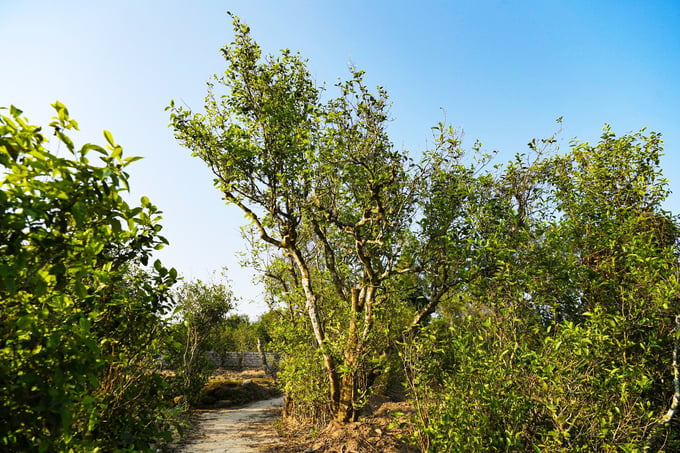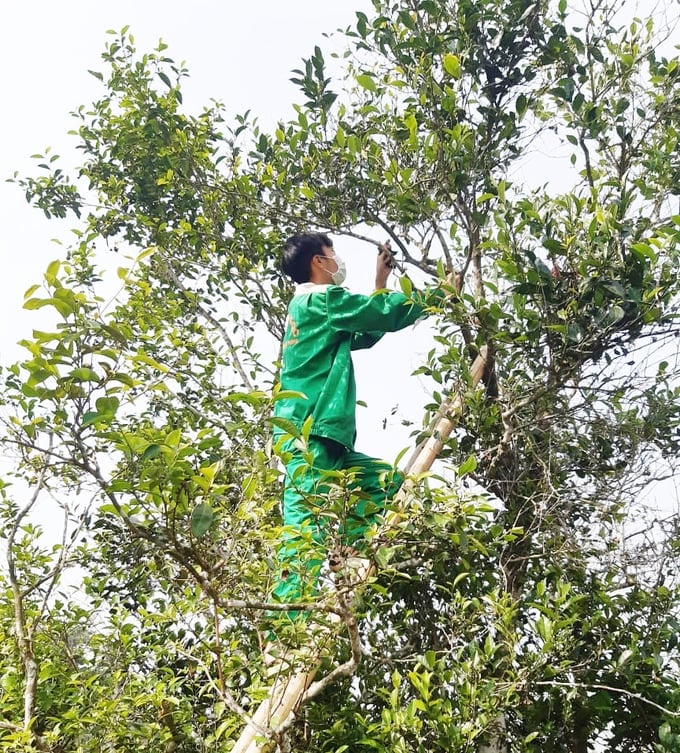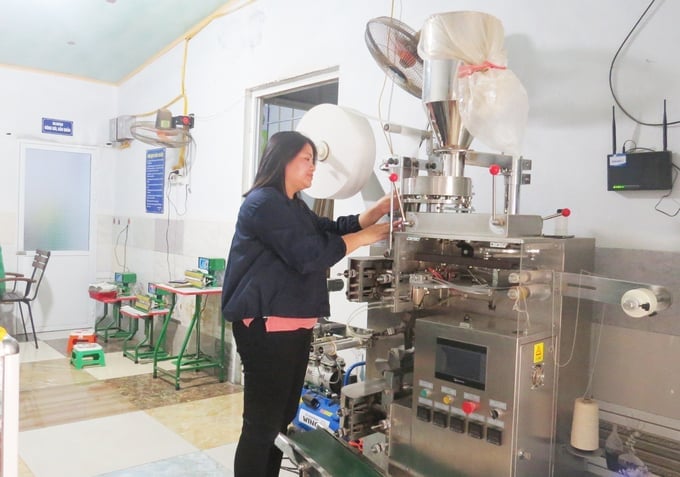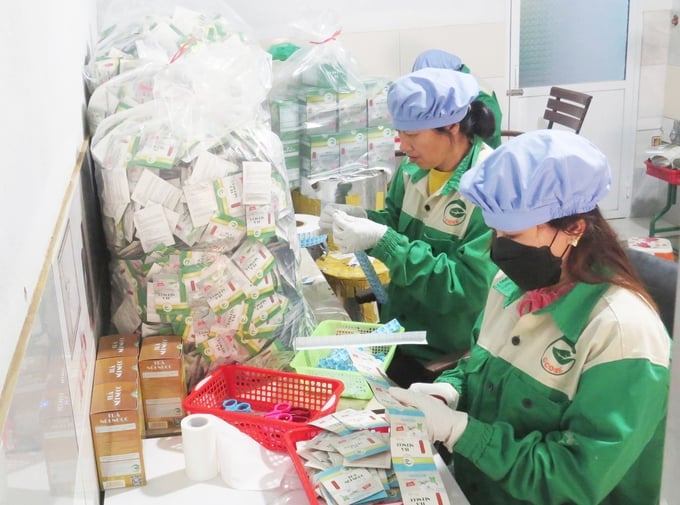May 21, 2025 | 06:46 GMT +7
May 21, 2025 | 06:46 GMT +7
Hotline: 0913.378.918
May 21, 2025 | 06:46 GMT +7
Hotline: 0913.378.918
In the region of Ngoc Mountain, Do Son district (Hai Phong City), where the Tuong Long pagoda was constructed during the reign of King Ly Thanh Tong, there are currently 17 ancient trees that have stood for 700-800 years, recognized as Vietnam's cultural heritage by the Vietnam Association for Nature and Environment Protection.
Notably, on Ngoc Mountain, nearly 10 hectares of ancient tea trees, centuries old, thrive. Nurtured by the rich, fertile soil atop the sacred mountain, undisturbed by human interference, and sustained by the underground flow of the Rong Stream, these tea hills remain verdant throughout the year, despite minimal cultivation.
Moreover, with extensive experience, the local residents primarily utilize tea for personal consumption or as gifts for acquaintances. Consequently, the entire production and processing chain refrains from using chemicals, resulting in a distinctly valuable product.

The ancient tea trees on Ngoc mountain, Do Son district. Photo: Dinh Muoi.
Mr. Nguyen The Anh, Chairman of the People's Committee of Ngoc Xuyen Ward (Do Son district), stated that there are currently approximately 7-8 hectares of green tea on Ngoc Mountain, with this area dispersed among individual households. These tea trees have been present in the region for several centuries. Due to the favorable climate, soil conditions, and traditional care methods without the use of chemicals, the tea products exhibit a delightful aroma and taste, earning them high favor among both locals and tourists.

People have to climb ladders to harvest tea. Photo: Dinh Muoi.
Capitalizing on these values, the tea from Ngoc mountain has been processed into OCOP (One Commune One Product) products, becoming one of the distinctive local products. The local authorities are taking concrete actions to protect the tea plantations, catering to tourism while preserving the bestowed natural values and ensuring income for the residents.
"Ngoc Mountain is the only mountainous region with ancient tea trees bordering the sea in Vietnam. Due to the unique climatic conditions and soil characteristics, it is challenging for tea trees to thrive on land exposed to sunlight, wind, storms, and sea salt mist, especially without irrigation and minimal cultivation. Nonetheless, they remain lush, fragrant, delicious, and nutrient-rich," shared Mr. Anh.
As someone who exploits the potential of this tea-growing region to create highly-ranked OCOP products in Hai Phong, Ms. Nguyen Thi Bo, the Director of the Community Green Enterprise Joint Stock Company, recounted that, during a visit to Tường Long Pagoda, she found the tea's uniqueness intriguing. In August 2020, she began researching the tea's origins and cultivation processes by collaborating with local authorities and residents to develop a distinctive product for Do Son.
Following a thorough survey, it was observed that tea cultivation on Ngoc Mountain is carried out organically by the local community, resulting in a clean product. Despite the challenging coastal mountain climate, the tea trees thrive, displaying longevity of several centuries on the sacred mountain. In light of this, Ms. Ngoc resolved to establish an OCOP (One Commune One Product) named Ngoc Mountain Tea.

Ms. Nguyen Thi Bo has invested in modern machinery to process unique products from tea plants on Ngoc Mountain. Photo: Dinh Muoi.
"In my research, even the oldest residents of Do Son affirmed that they have seen tea trees since their childhood, and the origins are lost in time. The local government supports residents by providing loans to preserve the green tea trees on Ngoc Mountain. This is a natural product, contributing to the health and well-being of consumers," recalled Ms. Nguyen Thi Bo.
According to Ms. Bo, the products are manufactured using modern technology, retaining the original flavor of the raw materials, and ensuring freshness and aroma. To achieve these high-quality products, the company has invested in state-of-the-art machinery to meet the highest standards.

Nui Ngoc Tea is an organic product, free from preservatives, additives, artificial colors, and flavorings. Photo: Dinh Muoi.
Throughout the production process, all products undergo testing at reputable institutions with globally recognized quality assessments. In reality, Ngoc Mountain Tea has proven its value and successfully penetrated both domestic and international markets, with exports to the United States starting in September 2021, reaching a monthly quantity of 5,000 boxes.
The U.S. market, known for its stringent requirements, demands that products meet strict criteria set by partners, comply with ISO 22000:2008 standards, and possess FDA certification. Exporting successfully to such a demanding market as the U.S. is a significant opportunity for Ngoc Mountain Tea to affirm its value and expand into other markets.
In addition to exporting to the U.S., following OCOP certification, Ms. Bo has engaged with and distributed products to 15 agents in Hanoi, Hai Phong, and Ho Chi Minh City, creating stable employment for numerous local workers.
Furthermore, Ngoc Mountain Tea has entered supermarket chains, and convenience stores, and is available in stalls along Do Son Beach, pedestrian streets, and tourist destinations to introduce it to both domestic and international tourists.
"This is an organic product; we refrain from using preservatives, additives, coloring, or flavorings. Consequently, the shelf life of the product is only 12 months. This sets Ngoc Mountain Tea apart from many other tea products on the market. Ngoc Mountain Tea is a product of perfection and will always be so," Ms. Bo expressed confidently.
Translated by Linh Linh

(VAN) In 2024, over 295 million people across 53 countries and territories faced acute hunger—an increase of almost 14 million people compared to 2023, while the number of people facing catastrophic levels of hunger reached a record high.

(VAN) World Environment Day 2025 (June 5) carries the theme 'Beat Plastic Pollution' continuing to emphasize the global urgency of addressing the plastic waste crisis.

(VAN) This was the assessment shared by experts at the workshop titled 'Assessing the Role and Potential of Low-Emission Rice Production Systems in Vietnam,' held on the morning of May 19.

(VAN) Cai Rong Port is the fisheries control center of Quang Ninh, helping to monitor fishing vessels, combat IUU fishing, and remove the EC's 'yellow card'.

(VAN) The German Agricultural Society (DLG) explores the possibility of establishing a mechanization service center in Vietnam’s Mekong Delta to support farmers in accessing and utilizing advanced machinery.

(VAN) On May 16, the Department of Water Resources Management, in collaboration with the Food and Agriculture Organization of the United Nations (FAO), held a signing ceremony for the GEF-8 project document.

(VAN) Food safety, mechanization, vocational training, and market opening are key areas of cooperation expected between the Vietnamese Government and the Federal Republic of Germany.